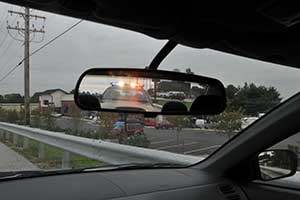The Museums Association Esmee Fairburn Collection Fund has awarded £120,000 to the National Justice Museum to introduce its unique 200-year-old HM Prison Service collection to a wider audience.
The funding supports a three-year project ‘Ingenuity, Creativity, Hope’ involving people in… more
The Federation has given a “cautious welcome” to the news that the Government is to consult on proposed changes to the law in relation topolice response driving.
Pursuits lead Tim Rogers says the development is a move in the right direction after the Home Office today (Tuesday 22 May) launched a consultation on proposals to amend proposes the legislation on careless and dangerous driving to recognise the high level of training and skill possessed by trained police drivers.
It also aims to clarify the situation regarding officers who pursue motorcyclists, and will also ask for views as to whether the changes should also apply to police response driving.
Mr Rogers said:
“We welcome this announcement as it is unacceptable to have officers trained to drive in a way that exposes them to prosecution merely for doing the job the public expect of them. But I stress this is a cautious welcome. This has been an issue we have been campaigning on now for seven years, and although it is a positive step that the Government have finally agreed that a legislation change is required, they must now act quickly to prevent more officers suffering unnecessary and often mendacious prosecutions. 
“It is crucial we protect the people who protect us and give them the confidence to be able to do their jobs and keep the public safe.”
The Home Office says that the changes would send a clear message that criminals cannot escape arrest simply by driving recklessly.
And that they aim to ‘smash the myth’ that officers cannot pursue riders who are not wearing helmets by making it clear that a suspect is responsible for their own decision to drive dangerously and that blame should not be attached to the pursuing officer.
Under current law, the same legal test for careless and dangerous driving offences is applied to police officers and the general public. Police have expressed concern that officers have to rely on Crown Prosecution Service (CPS) discretion to avoid prosecution and face lengthy Independent Office for Police Conduct (IOPC) investigations and suspension from duty, only to be cleared eventually.
The Government is consulting on a separate test for police drivers that would require:
- An officer to drive to the standard of a careful and competent police driver of a similar level of training and skill
- That the driving tactics employed, including any exemptions from road traffic legislation, such as speed limits, or contact with a suspect vehicle, are authorised appropriately and are both necessary and proportionate.
Minister for Policing and the Fire Service, Nick Hurd, said:
“Police officers must have the confidence to pursue suspects where it is safe to do so and criminals should be in no doubt that they will not get away with a crime by simply driving recklessly. Our proposed changes will make sure that skilled police drivers who follow their rigorous training are protected, while ensuring the minority of officers who do cross the line are robustly held to account.”
The proposals follow a review of Response driving, guidance and practice surrounding police pursuits, announced in September 2017.
The review identified other relevant work already underway in this area, including ongoing reform of the IOPC, which should speed up the decision-making process.
The Government plans to bring forward comprehensive road safety legislation as a result of the consultation.



